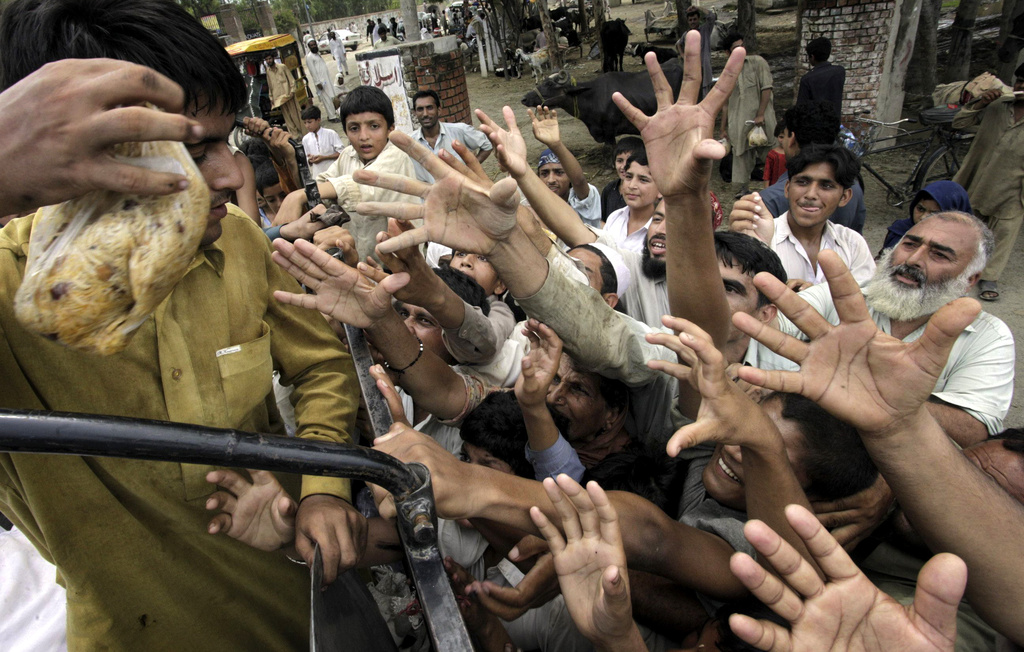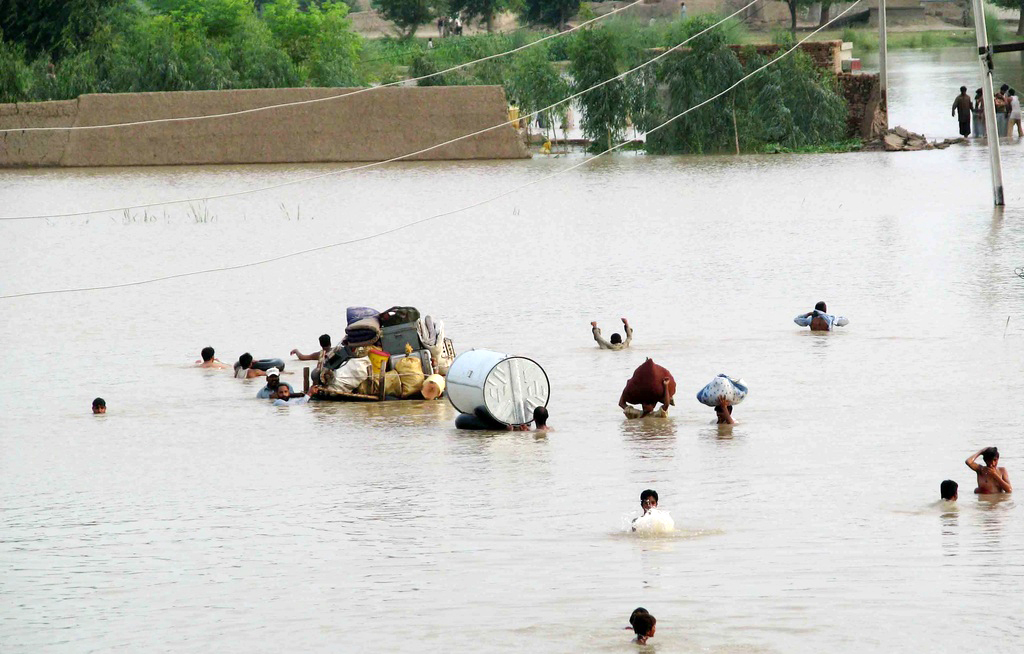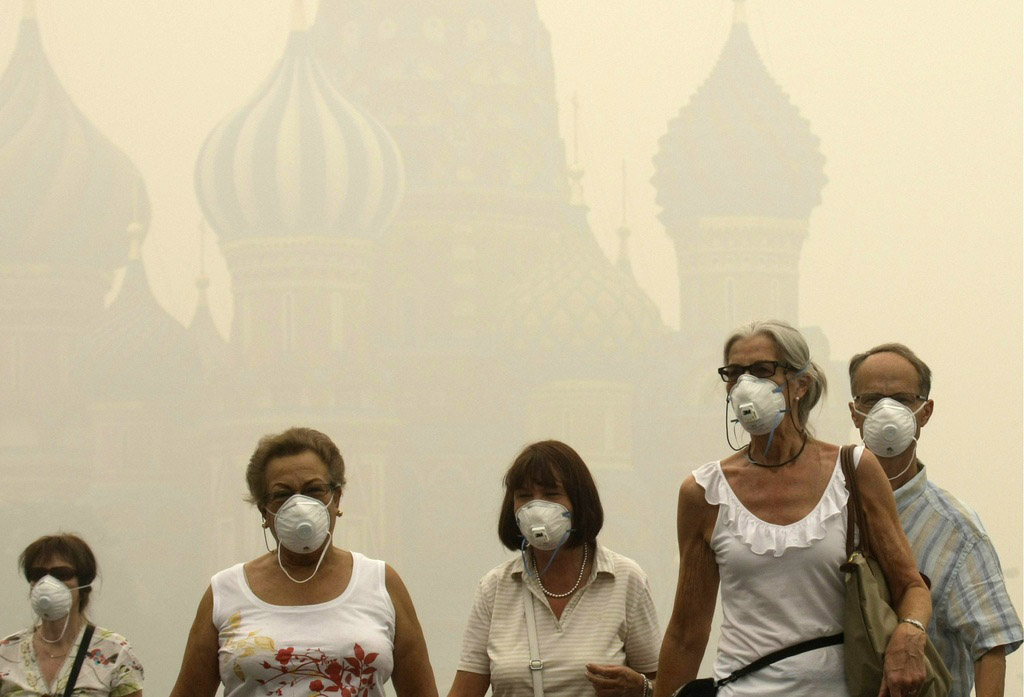Magnitude of Pakistan crisis starts to surface

With rains set to continue for at least a week in Pakistan, needs are enormous and funds are still desperately required to help the millions affected by the flooding.
But the international community is only now starting to grasp the full scale of the disaster unfolding, Zamir Akram, Pakistan’s ambassador to the United Nations told journalists in Geneva on Tuesday.
“The initial response was sluggish and disappointing, but awareness is growing,” Akram said.
The UN launched an appeal last week for almost $460 million (SFr479.4 million) in emergency assistance for victims of the country’s worst floods in living memory.
Governments have so far pledged $161 million of emergency funds – or 35 per cent of the total – alongside $140 million in bilateral aid, explained Akram.
He said his government is hoping a special session of the UN General Assembly in New York on the Pakistan flooding will generate greater international commitment to the relief effort, without forgetting reconstruction needs. Some experts estimate it could take five years and $15 billion for the country to recover.
Insufficient response
“The money’s coming, but that doesn’t mean the situation is perfect,” said Elisabeth Byrs, spokeswoman for the UN Office for the Coordination of Humanitarian Affairs.
Aid agencies, which have rushed food, water, shelter and medical treatment to the worst-hit areas in the northwest and Punjab and Sindh provinces, are increasingly vocal about the insufficient international response.
The World Food Programme (WFP), which has distributed food to one million people out its the six million target, urgently called for additional funds on Tuesday, as food stocks were “under heavy pressure” for September.
The UN children’s agency, Unicef, said it was seriously worried about funding shortfalls for its water and sanitation operation, with 3.5 million children in danger of contracting deadly waterborne diseases, like cholera, diarrhea and dysentery.
“Pakistan’s emergency continues to worsen as bloated rivers head southwards,” added Andrej Mahecic, spokesman for the UN High Commission for Refugees.
“In Balochistan people still need everything – shelter, food, clean drinking water, and health and hygiene systems. We need more airlifts and massive amounts of funding to meet the still unfolding crisis.”
“The size of England”
Aid officials say they should get a better idea of the overall needs by the end of the month when a joint assessment is completed. But according to the Pakistan ambassador, the “massive devastation” wrought by the floods that began three weeks ago, have affected 14 million people – one tenth of the population – and an area “the size of England”.
The swollen Indus river, which runs through the country, was now 35 kilometres wide in some places, he explained.
Hundreds of thousands of homes and other buildings, including schools and hospitals, have been swept away, and crops for domestic food consumption and for export have been lost.
One of the key questions is whether farmers will be able to plant their winter wheat crop in September.
With huge destruction, pockets of villagers remain cut off and access is a huge challenge, explained Rolf Stocker, in charge of humanitarian aid at the Swiss Interchurch Aid organisation.
“Roads and bridges are inaccessible and for the moment only the army and large humanitarian organisations have helicopters,” he said.
The Swiss organisation recently started distributing food aid and essential household items for 30,000 people in Malakand district in the northwest of the country.
Swiss response
The Swiss government has increased its humanitarian aid to Pakistan. The Swiss Agency for Development and Cooperation (SDC) had originally set aside SFr6.7 million for Pakistan.
The Swiss government released another SFr4 million in emergency aid following the disaster. The Geneva-based International Committee of the Red Cross (ICRC) will receive SFr3 million and SFr1 million has been pledged to WFP.
Switzerland has also sent six aid experts to the disaster region to determine the needs of the flood victims in preparation for medium-term projects, essentially water supply and shelter. Five other SDC experts are also on the ground helping coordinate relief.
On Monday the foreign ministry said the authorities were “currently analysing the form of future development” for Pakistan in light of the floods.
In August 2008 the government decided to reduce from 17 to 12 the number of countries it focused heavily on for development projects. Pakistan, which had been on the priority list for 40 years, was among those nations where projects were due to be scaled back.
According to the SDC website, a few elements of the outgoing programmes are to be included in a new programme that will focus on development aid near Pakistan’s northern border areas. Parliament has approved a SFr5 million budget for those efforts.
Swiss Solidarity – the charitable arm of the Swiss Broadcasting Corporation – is holding a special fundraising day for Pakistan on August 18. Its partner relief organisations in Pakistan include Caritas Switzerland, Swiss Interchurch Aid, the Swiss Red Cross and the Salvation Army.
Simon Bradley, swissinfo.ch
Switzerland’s development cooperation with Pakistan began in 1966 and has focused on alleviating poverty and supporting disadvantaged population groups.
The agency provided extensive humanitarian assistance in the North West Frontier Province after the 2005 earthquake. It also supports measures to improve the living conditions of refugees and internally displaced persons.
In 2008, the government decided to reduce the number of agency priority countries and Pakistan will no longer be categorised as such by the end of 2011.
On August 16, 2010, the foreign ministry said the authorities were “currently analysing the form of future development” for Pakistan in light of the floods.
The total Swiss government bilateral commitment for Pakistan for 2010 originally stood at SFr17.4 million.
(Source: Swiss Agency for Development and Cooperation)

In compliance with the JTI standards
More: SWI swissinfo.ch certified by the Journalism Trust Initiative














You can find an overview of ongoing debates with our journalists here . Please join us!
If you want to start a conversation about a topic raised in this article or want to report factual errors, email us at english@swissinfo.ch.